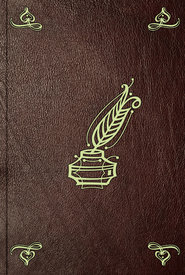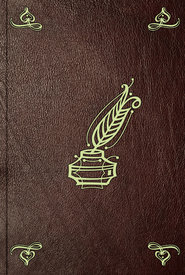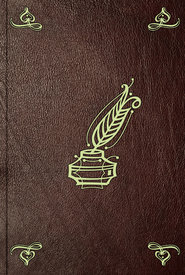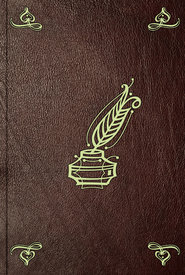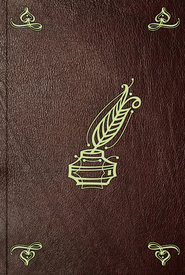По всем вопросам обращайтесь на: info@litportal.ru
(©) 2003-2024.
✖
Stories from the Faerie Queen, Told to the Children
Настройки чтения
Размер шрифта
Высота строк
Поля
One day, when they were all gathered together, Cambell told them that he had made a plan by which they could decide which of them was to marry Canacee.
‘Choose from amongst yourselves,’ said he, ‘the three knights that you all think the bravest and the best fighters, and I shall fight them, one by one. The knight who beats me shall have my sister Canacee for his wife.’
Now all the knights knew that Canacee had given her brother a magic ring, and that, as long as he wore it, no matter how deep a wound he got, the wound would not bleed, and he would not die.
‘It is very well for Cambell,’ they said. ‘We cannot kill him, but he can kill us.’
So they would not fight, even to win Canacee.
But the three brothers, Priamond, Diamond, and Triamond, were not afraid.
‘We will fight with you, Cambell,’ they said, ‘for all of us love Canacee.’
So a day was fixed for this great fight. On the morning of the day, no sooner was it light than the three brothers in their shining armour were ready on the field. Crowds of people came to watch the fight, and there were six judges to see that the knights fought fairly. Canacee, in a beautiful dress, sat on a high platform whence she could see all that went on. When Cambell strode into the field, he looked as if he were quite sure of defeating all three knights.
Then came Priamond, Diamond, and Triamond, marching together, in splendid armour, with their gay-coloured banners flying.
They bowed low before Canacee, the lady they loved, and the trumpets sounded and sweet music played.
Then a trumpet blew loudly, and Cambell and stout Priamond began to fight.
Furiously they struck at each other, and at last Priamond’s spear went through Cambell’s shoulder. But although the shoulder was pierced, and the pain from the wound was terrible, not a single drop of blood fell from it. So they fought and fought, until Cambell’s spear was driven through brave Priamond’s neck. Like a great oak-tree that the storm has struck, Priamond tottered, then fell with a mighty crash. There, on the ground, he lay bleeding and dead.
When he died, all his strength passed into his two brothers, as the Three Fates had promised to his fairy mother.
A second time the trumpet sounded, and slight little Diamond, his battle-axe in his hand, fiercely rushed at Cambell.
So furiously did they hew and hack at each other, that their armour was cut and gashed as if it had been rotten wood. No blood flowed from Cambell’s wounds, but Diamond’s blood gushed fast, and reddened the green turf.
Fierce little Diamond grew tired at last of hacking and hewing and yet never killing Cambell. So he put all his strength into one terrible stroke, and swung his axe round with all his might. Had the blow reached Cambell it must have chopped his head in two, but Cambell swerved aside. Diamond had used so much force, that when he missed his aim his foot slipped. Cambell took the chance, let drive at him with all his power, and with his axe cut Diamond’s head clean off.
For a moment Diamond’s headless body stood still. Then gallant little Diamond fell dead on the ground. As he fell, all his strength, and the strength of Priamond, went into Triamond, the youngest brother.
Then Triamond, stronger and more angry than he had ever been before, lightly sprang up from where he had sat to watch the fight.
His strokes fell like hail on Cambell’s armour. He struck, he thrust, he hewed, he hacked, till the sparks flew from his sword like the shining drops that are dashed from a waterfall.
Sometimes Triamond seemed to be winning; sometimes Cambell. The blood gushed from Triamond’s wounds, till he grew faint. But although Cambell was covered with wounds the magic ring stopped his blood from flowing, so that he grew no less strong. When he saw Triamond growing weak, he smote him in the throat with all his might, and Triamond fell down as if he were dead.
But Triamond did not die. From the fearful wound all the strength that had belonged to his brother Priamond ebbed away. Still he had his own strength and Diamond’s strength left.
So he rose up again, and Cambell, who had thought him dead, was so amazed that Triamond gave him a hard stroke before he had time to defend himself. Then Cambell fought with more care, and seemed rather to try to save himself than to try to kill Triamond. Triamond, seeing this, thought that Cambell must be tired, and that he could easily beat him now. With that he whirled up his sword to give a fearful blow. But Cambell, quick as lightning, thrust his sword under Triamond’s upraised arm, so that it passed right through his body and came out at the other side. Even then the blow that Triamond struck was such a terrible one, that it cut through Cambell’s steel helmet and gashed open his head, and he fell senseless to the ground.
Triamond, too, fell down, and out of his wound all Diamond’s strength ebbed away.
When those who looked on saw this, they thought that the fight was at an end, because the fighters all lay dead.
Canacee began to cry because her brother and the brave knight who loved her were slain. But in a moment both knights rose to their feet again.
Those who watched could not believe their eyes when they saw them begin to fight as fiercely as before.
While every one stared in wonder and in fear, because they knew that soon the knights must surely kill each other, a loud noise suddenly drowned the clash of weapons.
It was a sound as of women and boys shouting and screaming in a panic.
Cambell and Triamond stopped their fight for an instant to listen and to look at the place from whence the noise came.
They saw a golden chariot, decked with wonderful ornaments, whirling towards them with the force of a storm. Two fierce lions drew the chariot, and in it sat a lady, whose face shone with beauty and goodness.
It was Triamond’s sister, Cambina, who knew more about magic than almost any one else in all Fairyland.
When the crowds who watched saw her and her growling lions, they huddled together like frightened sheep. Some laughed, most of them screamed, and all of them ran till the dust flew up in clouds.
In one hand Cambina carried a magic wand with two serpents twisted round it. In the other she held a golden cup filled with a magic drink, that made those who drank of it forget all anger and bitterness, and filled their hearts with happiness and friendship and peace.
When Cambina came to the wooden barrier that shut off the watchers from the field where the knights had fought, she softly struck the rail with her wand.
It flew open, and the lions dashed in with Cambina’s glittering chariot.
She got out of her chariot and ran up to the two knights, and begged them to fight no more. But they would not listen, and began to fight again.
Then she knelt on the bloodstained ground, and besought them with tears to lay down their swords. When they still went fiercely on, she smote them lightly with her magic wand.
Their swords fell to the ground, and while they stared at each other in wonder, Cambina handed them her golden cup. They were so hot and thirsty that they gladly drank. And, as they drank, all anger went out of their hearts, and love for each other took its place. They kissed, and shook hands, and vowed that they would be friends for evermore.
When the people saw this, they shouted and cheered for gladness till all the air rang.
And Canacee ran down from her platform and kissed Cambina, who had stopped the fearful fight and made Canacee’s brother and her lover friends.
Then the trumpets sounded, and Cambina took Canacee into her chariot beside her, and the lions galloped off to Canacee’s palace. And all the people thought how beautiful were these two lovely ladies, whose faces were fresh as morning roses and radiant with happiness.
Cambell and Canacee gave a great feast that lasted for days and days.
And Triamond married Canacee, and Cambell married Cambina, and they all lived happily and peacefully ever afterwards.
VII
MARINELL, THE SEA-NYMPH’S SON
Sometimes when the sun is rising on the sea and making the waves all pink and gold, the sailors whose boats are sailing out of the grey night fancy that they see fair ladies floating on the white crests of the waves, or drying their long yellow hair in the warm sunshine.
Sometimes poets who wander on the beach at night, or sit on the high cliffs where the sea-pinks grow, see those beautiful ladies playing in the silver moonlight.
And musicians hear them singing, singing, singing, till their songs silence the sea-birds harsh cry, and their voices blend with the swish and the rush of the sea and the moan of the waves on the shore.
The sailors tell stories of them, and the musicians put their songs into their hearts. But the poets write poems about them, and say: —
‘There are no ladies so fair to see as the nymphs whose father is a king.
Nereus is their father, and they are the Nereids.
‘Choose from amongst yourselves,’ said he, ‘the three knights that you all think the bravest and the best fighters, and I shall fight them, one by one. The knight who beats me shall have my sister Canacee for his wife.’
Now all the knights knew that Canacee had given her brother a magic ring, and that, as long as he wore it, no matter how deep a wound he got, the wound would not bleed, and he would not die.
‘It is very well for Cambell,’ they said. ‘We cannot kill him, but he can kill us.’
So they would not fight, even to win Canacee.
But the three brothers, Priamond, Diamond, and Triamond, were not afraid.
‘We will fight with you, Cambell,’ they said, ‘for all of us love Canacee.’
So a day was fixed for this great fight. On the morning of the day, no sooner was it light than the three brothers in their shining armour were ready on the field. Crowds of people came to watch the fight, and there were six judges to see that the knights fought fairly. Canacee, in a beautiful dress, sat on a high platform whence she could see all that went on. When Cambell strode into the field, he looked as if he were quite sure of defeating all three knights.
Then came Priamond, Diamond, and Triamond, marching together, in splendid armour, with their gay-coloured banners flying.
They bowed low before Canacee, the lady they loved, and the trumpets sounded and sweet music played.
Then a trumpet blew loudly, and Cambell and stout Priamond began to fight.
Furiously they struck at each other, and at last Priamond’s spear went through Cambell’s shoulder. But although the shoulder was pierced, and the pain from the wound was terrible, not a single drop of blood fell from it. So they fought and fought, until Cambell’s spear was driven through brave Priamond’s neck. Like a great oak-tree that the storm has struck, Priamond tottered, then fell with a mighty crash. There, on the ground, he lay bleeding and dead.
When he died, all his strength passed into his two brothers, as the Three Fates had promised to his fairy mother.
A second time the trumpet sounded, and slight little Diamond, his battle-axe in his hand, fiercely rushed at Cambell.
So furiously did they hew and hack at each other, that their armour was cut and gashed as if it had been rotten wood. No blood flowed from Cambell’s wounds, but Diamond’s blood gushed fast, and reddened the green turf.
Fierce little Diamond grew tired at last of hacking and hewing and yet never killing Cambell. So he put all his strength into one terrible stroke, and swung his axe round with all his might. Had the blow reached Cambell it must have chopped his head in two, but Cambell swerved aside. Diamond had used so much force, that when he missed his aim his foot slipped. Cambell took the chance, let drive at him with all his power, and with his axe cut Diamond’s head clean off.
For a moment Diamond’s headless body stood still. Then gallant little Diamond fell dead on the ground. As he fell, all his strength, and the strength of Priamond, went into Triamond, the youngest brother.
Then Triamond, stronger and more angry than he had ever been before, lightly sprang up from where he had sat to watch the fight.
His strokes fell like hail on Cambell’s armour. He struck, he thrust, he hewed, he hacked, till the sparks flew from his sword like the shining drops that are dashed from a waterfall.
Sometimes Triamond seemed to be winning; sometimes Cambell. The blood gushed from Triamond’s wounds, till he grew faint. But although Cambell was covered with wounds the magic ring stopped his blood from flowing, so that he grew no less strong. When he saw Triamond growing weak, he smote him in the throat with all his might, and Triamond fell down as if he were dead.
But Triamond did not die. From the fearful wound all the strength that had belonged to his brother Priamond ebbed away. Still he had his own strength and Diamond’s strength left.
So he rose up again, and Cambell, who had thought him dead, was so amazed that Triamond gave him a hard stroke before he had time to defend himself. Then Cambell fought with more care, and seemed rather to try to save himself than to try to kill Triamond. Triamond, seeing this, thought that Cambell must be tired, and that he could easily beat him now. With that he whirled up his sword to give a fearful blow. But Cambell, quick as lightning, thrust his sword under Triamond’s upraised arm, so that it passed right through his body and came out at the other side. Even then the blow that Triamond struck was such a terrible one, that it cut through Cambell’s steel helmet and gashed open his head, and he fell senseless to the ground.
Triamond, too, fell down, and out of his wound all Diamond’s strength ebbed away.
When those who looked on saw this, they thought that the fight was at an end, because the fighters all lay dead.
Canacee began to cry because her brother and the brave knight who loved her were slain. But in a moment both knights rose to their feet again.
Those who watched could not believe their eyes when they saw them begin to fight as fiercely as before.
While every one stared in wonder and in fear, because they knew that soon the knights must surely kill each other, a loud noise suddenly drowned the clash of weapons.
It was a sound as of women and boys shouting and screaming in a panic.
Cambell and Triamond stopped their fight for an instant to listen and to look at the place from whence the noise came.
They saw a golden chariot, decked with wonderful ornaments, whirling towards them with the force of a storm. Two fierce lions drew the chariot, and in it sat a lady, whose face shone with beauty and goodness.
It was Triamond’s sister, Cambina, who knew more about magic than almost any one else in all Fairyland.
When the crowds who watched saw her and her growling lions, they huddled together like frightened sheep. Some laughed, most of them screamed, and all of them ran till the dust flew up in clouds.
In one hand Cambina carried a magic wand with two serpents twisted round it. In the other she held a golden cup filled with a magic drink, that made those who drank of it forget all anger and bitterness, and filled their hearts with happiness and friendship and peace.
When Cambina came to the wooden barrier that shut off the watchers from the field where the knights had fought, she softly struck the rail with her wand.
It flew open, and the lions dashed in with Cambina’s glittering chariot.
She got out of her chariot and ran up to the two knights, and begged them to fight no more. But they would not listen, and began to fight again.
Then she knelt on the bloodstained ground, and besought them with tears to lay down their swords. When they still went fiercely on, she smote them lightly with her magic wand.
Their swords fell to the ground, and while they stared at each other in wonder, Cambina handed them her golden cup. They were so hot and thirsty that they gladly drank. And, as they drank, all anger went out of their hearts, and love for each other took its place. They kissed, and shook hands, and vowed that they would be friends for evermore.
When the people saw this, they shouted and cheered for gladness till all the air rang.
And Canacee ran down from her platform and kissed Cambina, who had stopped the fearful fight and made Canacee’s brother and her lover friends.
Then the trumpets sounded, and Cambina took Canacee into her chariot beside her, and the lions galloped off to Canacee’s palace. And all the people thought how beautiful were these two lovely ladies, whose faces were fresh as morning roses and radiant with happiness.
Cambell and Canacee gave a great feast that lasted for days and days.
And Triamond married Canacee, and Cambell married Cambina, and they all lived happily and peacefully ever afterwards.
VII
MARINELL, THE SEA-NYMPH’S SON
Sometimes when the sun is rising on the sea and making the waves all pink and gold, the sailors whose boats are sailing out of the grey night fancy that they see fair ladies floating on the white crests of the waves, or drying their long yellow hair in the warm sunshine.
Sometimes poets who wander on the beach at night, or sit on the high cliffs where the sea-pinks grow, see those beautiful ladies playing in the silver moonlight.
And musicians hear them singing, singing, singing, till their songs silence the sea-birds harsh cry, and their voices blend with the swish and the rush of the sea and the moan of the waves on the shore.
The sailors tell stories of them, and the musicians put their songs into their hearts. But the poets write poems about them, and say: —
‘There are no ladies so fair to see as the nymphs whose father is a king.
Nereus is their father, and they are the Nereids.







